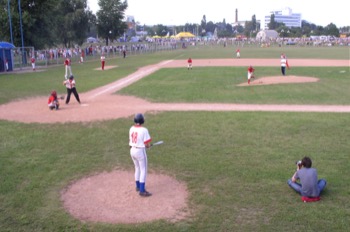Table of Contents
(?)
Site Page Counts
Public: 229
Restricted: 51
- Overview
- NY Kletsker Cemetery Data
- Searching for KIRZNER
- UKR 1946
- Benari Memoir
- Kletsk to Zaostrovechye
- Recreating Kletsk
- Pshepyurko Interview
- Sonia's Places
- Gelfand Memoir
- Yizkor Book
- Contributors Only
Site Page Counts
Public: 229
Restricted: 51
Using this Site
This site has been designed to be easy to use -- as simple as possible -- while taking advantage of technological aids.
Site Navigation
Navigation is the web term for getting around the web site. The fundamental technique is using hyperlinks, or links for short. Links can occur on any portion of text or any graphic, and -- in some cases -- specific areas within a graphic. Text links usually lead you to related material on another page. Links on photos may lead you to related material on another page. Or, clicking on a linked photo may display a larger version of that photo.
How do you find links? Although many alternatives may be seen in modern web sites, the standard method to indicate a text link is coloring the text and underlining in blue, as follows:
This is a link.
You probably already know that your browser remembers links you have recently followed, and displays them in purple, instead.
On this site, most photos and graphics are presented initially as thumbnails -- small versions of the original -- in order to save space and accommodate people who have slower Internet connections. These are marked on our site by a blue border, as follows:
 |
| Baseball Game, Brest Photo Credit: Yogi555 |
If you see a graphic without a noticeable blue border, the size you see is the only size we have.
Different browsers may use different additional ways of marking images leading to other images. Sometimes the cursor changes when you move it over a linked photo. What you see specifically will depend on your computer, browser, and setup.
Most text links that lead to other pages on our site do not open a new window (or tab, depending on your browser and its settings). There are exceptions for reference material that you might want to view simultaneously with the original. Links to other web sites should always open a new window.
Searching This Site
You can use Google to search this entire site for a keyword – or any combination of search terms and/or directives accepted by Google. For example, if you want to find pages containing "yeshiva" enter the following into the Google search box:
yeshiva site:www.kletsk.org
(The ordering seems to be important; specify the search terms first.) More specifically, to find the phrase "green shul":
"green shul" site:www.kletsk.org
Google offers this method among other tips and tricks, here.
Note: Recently-added content may not be detected by Google right away, so if your search fails, try again in a few days.
Table of Contents
We expect most people will navigate our site through the Table of Contents at the left of each page. This is essentially the same as you would find in a book, with the exception that you will only see subheadings in the single area you are examining. You can click on any visible link (underlined text) but the heading corresponding to the currently visible content at right is not functional as a link.
If this explanation seems too complicated, just try looking through the Table of Contents and click links you find. You'll almost certainly find it operates in a common-sense way.
For the Visually Impaired
Do you find the text on our site too small to read? This web site has been constructed with text sizes appropriate to viewers with average vision. With our limited resources, it is beyond our capacity to provide text size adjustments, but modern browsers provide you with a method for doing this. Please try to use these. If you need assistance, we will do our best to help. Please contact the webmaster.
It is the intent of web standards that alternative text descriptions be provided for all photographs and graphics so that visitors unable to view such content can understand what is depicted. With limited resources, we've done our best to provide such descriptions, but we know we've fallen short. If you depend on alternative text descriptions of photos, please contact the webmaster, and we'll work something out.
Our site looks different on a different computer or browser
Some web sites look the same no matter how you look at them. With others, you'll notice different text appearances, spacing, margins, etc. if you look at the same material on different computers.
Web authors use two general methods of making sites as consistent as possible: Using standard methods, and testing on multiple computers, browsers, and different versions of the same browsers.
This site is constructed using standard methods -- the simplest possible methods -- to make the site work. But we just don't have the resources to test extensively, so you will need to excuse minor variations in appearance. If you find variations that interfere with your using the site, please report those to the webmaster and we'll do our best to address them.
About the Notes and Comments
The Notes and Comments section is an experimental method of bringing you extra material about the main content of the page. Some of the text in this section may describe what we'd like to do in the future, material we'd like to have on the page. Other text may provide additional background on the main content.